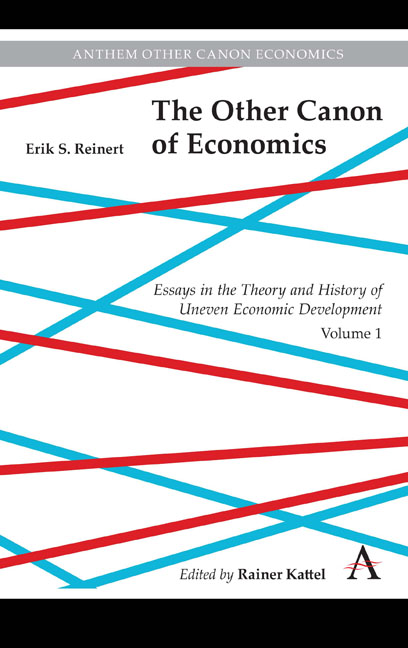Book contents
- Frontmatter
- Dedication
- Contents
- Introduction
- Chapter 1 Catching-up from Way Behind. A Third World Perspective on First World History
- Chapter 2 Recent Trends in Economic Theory — Implications for Development Geography
- Chapter 3 A Schumpeterian Theory of Underdevelopment - A Contradiction in Terms?
- Chapter 4 Competitiveness and Its Predecessors - A 500-Year Cross-national Perspective
- Chapter 5 Diminishing Returns and Economic Sustainability: The Dilemma of Resource-based Economies under a Free Trade Regime
- Chapter 6 Economics: ‘The Dismal Science’ or ‘The Never-ending Frontier of Knowledge’? On Technology, Energy and Economic Welfare
- Chapter 7 Production Capitalism vs. Financial Capitalism – Symbiosis and Parasitism. An Evolutionary Perspective and Bibliography
- Chapter 8 Globalization in the Periphery as a Morgenthau Plan: The Underdevelopment of Mongolia in the 1990s
- Chapter 9 Increasing Poverty in a Globalized World: Marshall Plans and Morgenthau Plans as Mechanisms of Polarization of World Incomes
- Chapter 10 An Early National Innovation System: The Case of Antonio Serra’s 1613 Breve Trattato
- Chapter 11 Innovation Systems of the Past: Modern Nation-States in a Historical Perspective. The Role of Innovations and of Systemic Effects in Economic Thought and Policy
- Chapter 12 The Other Canon: The History of Renaissance Economics
- Chapter 13 Benchmarking Success: The Dutch Republic (1500–1750) as Seen by Contemporary European Economists
- Chapter 14 Mercantilism and Economic Development: Schumpeterian Dynamics, Institution Building and International Benchmarking
- Chapter 15 Development and Social Goals: Balancing Aid and Development to Prevent ‘Welfare Colonialism’
Chapter 13 - Benchmarking Success: The Dutch Republic (1500–1750) as Seen by Contemporary European Economists
Published online by Cambridge University Press: 13 April 2024
- Frontmatter
- Dedication
- Contents
- Introduction
- Chapter 1 Catching-up from Way Behind. A Third World Perspective on First World History
- Chapter 2 Recent Trends in Economic Theory — Implications for Development Geography
- Chapter 3 A Schumpeterian Theory of Underdevelopment - A Contradiction in Terms?
- Chapter 4 Competitiveness and Its Predecessors - A 500-Year Cross-national Perspective
- Chapter 5 Diminishing Returns and Economic Sustainability: The Dilemma of Resource-based Economies under a Free Trade Regime
- Chapter 6 Economics: ‘The Dismal Science’ or ‘The Never-ending Frontier of Knowledge’? On Technology, Energy and Economic Welfare
- Chapter 7 Production Capitalism vs. Financial Capitalism – Symbiosis and Parasitism. An Evolutionary Perspective and Bibliography
- Chapter 8 Globalization in the Periphery as a Morgenthau Plan: The Underdevelopment of Mongolia in the 1990s
- Chapter 9 Increasing Poverty in a Globalized World: Marshall Plans and Morgenthau Plans as Mechanisms of Polarization of World Incomes
- Chapter 10 An Early National Innovation System: The Case of Antonio Serra’s 1613 Breve Trattato
- Chapter 11 Innovation Systems of the Past: Modern Nation-States in a Historical Perspective. The Role of Innovations and of Systemic Effects in Economic Thought and Policy
- Chapter 12 The Other Canon: The History of Renaissance Economics
- Chapter 13 Benchmarking Success: The Dutch Republic (1500–1750) as Seen by Contemporary European Economists
- Chapter 14 Mercantilism and Economic Development: Schumpeterian Dynamics, Institution Building and International Benchmarking
- Chapter 15 Development and Social Goals: Balancing Aid and Development to Prevent ‘Welfare Colonialism’
Summary
This chapter looks at the Dutch Republic from the vantage point of the economists of the period. These pre-Smithian economists are normally grouped together in the history of economic thought under the decidedly derogatory label of ‘mercantilists’. Under its standard Whig conception, any idea in the history of economic thought – as identified almost a century ago by English historical economist Ashley – instead of being judged by its relevance in a given context, is either hailed as a surprising early anticipation of a healthy neoclassical economic principle or as an example of hopelessly ill-conceived theories (Ashley 1920: II, 381).
I would argue that as a tool in order to understand the rise and fall of the Dutch Republic, mercantilism had some clear analytical advantages over neoclassical economics. Not only was the mercantilist or pre-Ricardian economists’ toolbox much larger than today’s, the pre-Ricardian system already included a large number of economic factors which the profession presently attempts to re-introduce to mainstream economics. Examples of what gradually was left out of economics starting with Adam Smith are innovations – part of English economics from Francis Bacon (1561–1626) until and including James Steuart's important work (1767) – technology, increasing returns, institutions, geography, synergies, path dependency, that economic activities are qualitatively different as carriers of economic growth, the idea that economic policy should be context-specific, and the whole fundamental question of why economic development is by nature so uneven. With the English classical economists economic theory gradually lost its previous understanding of the vicissitudes of technology and production, and came to concentrate upon trade and prices. The contemporary mercantilists are therefore likely to provide a much richer analysis of the Dutch Republic than what is found in the works of the later classical economists.
Mercantilism can productively be seen both as state- and nation-building (Schmoller 1897/1976) and as a strategy of industrial import substitution (Perrotta 1993), which at the time was seen as two sides of the same coin.1 To the laggard countries of Europe, the Dutch Republic provided important inspiration on both these accounts. That inspiration did not come from Dutch policies, but by asking what policies would have to be created in order to achieve the same results as those observed in the Dutch productive system, but under very different circumstances and conditions; in very different contexts.
- Type
- Chapter
- Information
- The Other Canon of EconomicsEssays in the Theory and History of Uneven Economic Development, pp. 421 - 450Publisher: Anthem PressPrint publication year: 2024

